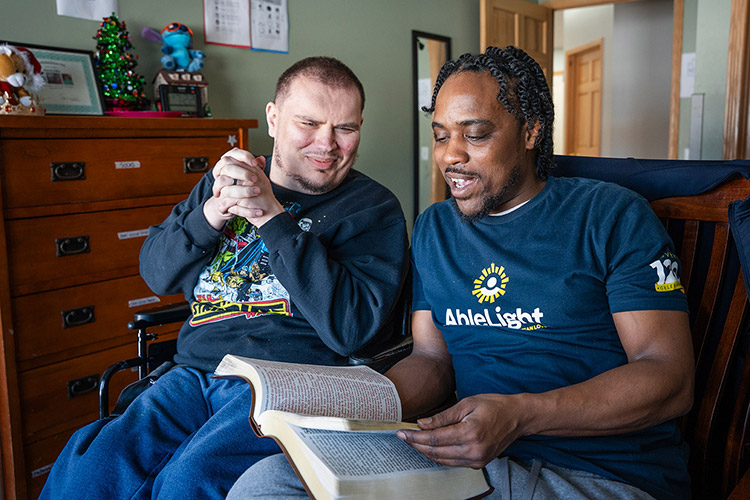Easter is a time of reflection, renewal, and hope. It’s a time when many gather in faith communities to celebrate hope, connection and Jesus’s resurrection. For many people with developmental disabilities, this season can hold deep spiritual meaning.
Spiritual wellness is a key part of overall well-being. It involves finding purpose, connection, and meaning, often through faith, community, and reflection. For many individuals with developmental disabilities, participating in spiritual life (whether through worship, prayer, or quiet connection with nature) can be deeply fulfilling. Yet barriers often prevent full inclusion.
Understanding the Barriers
People with developmental disabilities face unique challenges in engaging with faith communities. Physical limitations, communication differences, and lack of transportation can make attending services or participating in spiritual activities difficult. In many cases, individuals may want to participate but lack the means to do so.
Social barriers often add to the difficulty. Many faith communities are not fully equipped or prepared to support people with developmental disabilities. A lack of awareness or inclusive practices can lead to unintentional exclusion, leaving individuals feeling unwelcome or overlooked. Communication challenges can also make it difficult to share spiritual needs, ask questions, or feel fully understood.
These challenges impact more than just spiritual life. People with developmental disabilities face higher rates of mental distress (1) and social isolation. When individuals are unable to connect with their communities or engage in meaningful experiences, it can affect their emotional and overall health.
Spiritual well-being is closely tied to holistic wellness. As recent research highlights, integrating spiritual care into overall health practices supports individuals in reaching their highest standard of well-being. When spiritual needs go unmet, people may experience disconnection from themselves, their community, and the deeper source of purpose in their lives.
Building More Inclusive Faith Communities
Creating space for people with developmental disabilities in faith communities begins with understanding and intentionality. Supporting spiritual wellness may mean offering quiet rooms during spaces, adapting materials for accessibility, providing transportation support, or simply taking the time to listen and learn about an individual’s faith interests.
Faith organizations also benefit from fostering a culture of belonging. Inclusive communities often report stronger connections, greater diversity, and a deeper sense of shared purpose (Erik Carter, Baylor University). Faith communities that embrace people of all abilities help ensure that everyone has the opportunity to participate fully in the life of the church.
A Time to Reflect
Easter invites reflection not only on spiritual renewal, but also on how communities can better embody the values of welcome and compassion. As John 15:17 reminds us, “This is my command: Love one another.”
Meeting each person’s spiritual needs, whatever they may be, is one way to put that love into action. When the resurrected Jesus appeared to his followers, he gave them courage to think beyond their business-as-usual perspectives and prepare to overcome seemingly impossible barriers preventing others from belonging to his people as well!
To learn more about supporting spiritual wellness for people with developmental disabilities or how to create a more inclusive faith environment, email Jeff Siegel, AbleLight Director of Faith Integration.
[1] Cree RA, Okoro CA, Zack MM, Carbone E. Frequent Mental Distress Among Adults, by Disability Status, Disability Type, and Selected Characteristics – United States, 2018. MMWR Morb Mortal Wkly Rep. 2020 Sep 11;69(36):1238-1243. doi: 10.15585/mmwr.mm6936a2. PMID: 32914770; PMCID: PMC7499832. https://www.ncbi.nlm.nih.gov/pmc/articles/PMC7499832

